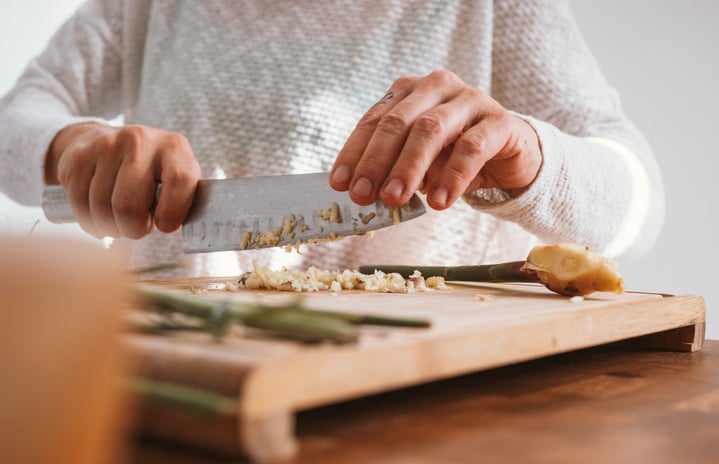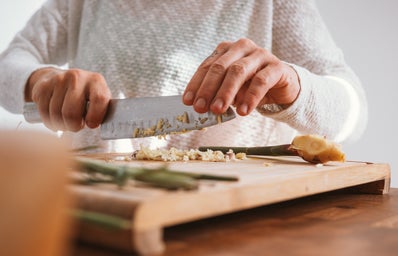“Now see the onion we cut? Try putting it in the bowl—you’re doing great,” said my grandmother.
I took a big fist of the pulverized onions my grandmother had previously made and dropped them in the bowl of shredded potatoes. I lifted my hand for a high-five as juice from the onions dripped down to my elbows and onto the floor of my grandparent’s kitchen that hadn’t been updated since the ‘70s. The Chicago December winter was grey and cold, yet the shades of orange and yellow from the menorah candles glowing on the kitchen counter made the whole room a beacon of warmth and comfort.
“That looks amazing! You know what, Lily? I think these are gonna be some of the best latkes we’ve had yet,” my grandmother exclaimed as she returned my high-five.
This is my first memory of cooking. I remember feeling so accomplished as I took the first bite of the latkes I made (well, really the latkes my grandmother made). Regardless, being able to taste the saltiness and crunch of the latke with the sweetness and tart bite of the applesauce also meant being able to connect with my family.
My relationship with my identity has been complicated, to say the least. I was adopted from China when I was less than a year old to a family of Ashkenazi-Jewish, third-generation Chicagoans. I’m close with my family and I was lucky enough to attend grade school with many other Asian kids, yet I never felt completely connected to either Jewish or Chinese culture. I was surrounded by a bit of both, but I always felt left out because (as many of my peers would make it abundantly clear) I would never be completely Jewish or Chinese to anyone. I had a lot of resentment towards other kids who knew much about their family’s cultural traditions, food and languages.
All I could think was, “I just want to feel like I belong.”
As I grew up, my mother would work late hours in order to become a licensed paramedic. I knew I would have to start cooking my own food since my mom wouldn’t be there to do it for me. In high school, I started to learn to cook. First, it was scrambled eggs. Then it was toast. Eventually, I graduated to a full steak dinner with a variety of roasted vegetables. Yet, throughout all this, I was terrified to even try making traditional Chinese or Ashkenazi food. I would get nervous at the idea of making anything beyond fried rice or the Passover charoset (a dish composed of chopped apples and walnuts mixed with cinnamon and sweet red wine—the ingredients vary among the Jewish diaspora).
It wasn’t until I decided to face my fears and make beef noodle soup that I truly got comfortable with connecting with my ethnicity. Beef noodle soup is a dish that’s eaten throughout East and Southeast Asia that consists of braised beef, a rich broth, noodles and vegetables. When I made it, it took nearly seven hours of chopping, simmering and stirring but in the end, the flavors I tasted and the knowledge I gained were more than worth it. I remember the feeling of looking down at my bowl that I so carefully constructed and being able to feel a little more tied to something I felt so far removed from for the majority of my life.
When my aunt heard that I made beef noodle soup, she suggested that I try my hand at matzo ball soup since we’d be having our family Hanukkah dinner the next week. I was intimidated, but I decided to give it a shot. I used my great-grandmother’s recipe and as I was reading, I noticed that matzo ball soup and beef noodle soup had many of the same principles, in element and in process, even though the ingredients were very different. Long story short, I made the soup and it was a hit among my family.
My relationship with my identity isn’t perfect. It’s something I still struggle with to this day, but learning to cook my cultural food made it a little easier. Being able to learn the process and put flavors together helped me feel more comfortable in my own skin and my relationships. Most importantly, it made me feel like there was a place for me in both aspects of my identity. It helped me feel like I belong.


